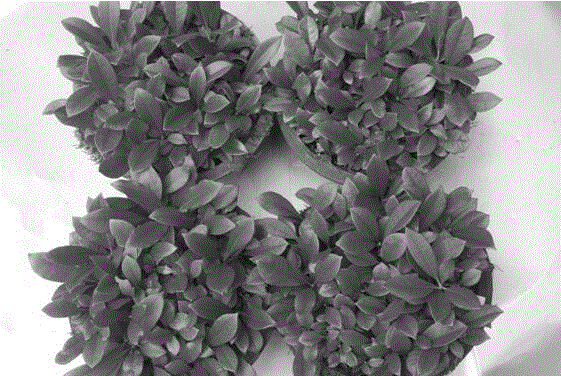Rhododendron simiarum Hance seed propagation method
A seed and rhododendron technology, applied in the field of plant propagation, can solve the problems of low endosperm nutrients, small rhododendron seeds, seedling dehydration and death, etc., achieve good moisture retention, fast new plants, reduce water management and disease control difficulties Effect
- Summary
- Abstract
- Description
- Claims
- Application Information
AI Technical Summary
Problems solved by technology
Method used
Image
Examples
Embodiment 1
[0019] The seed propagation method of Rhododendron erinaceus comprises the following steps:
[0020] 1. Seed collection: In the first ten days of November every year, the capsules of Rhododendron erinaceus turn from yellow to brown, and before they are about to crack, select capsules with large capsules, full seeds, and plants free from diseases and insect pests, and pick them together with fruit branches, and place them on straw paper or newspapers to dry indoors , In March of the second year, the capsules cracked naturally and the seeds were shaken out.
[0021] 2. Seedbed production: Sow seeds in mud tile pots with a diameter of 25 cm, add 6 cm of broken tiles, gravel and coarse-grained soil to the bottom of the pot to increase the water permeability of the substrate; add 9 cm of humus and vermiculite to the upper layer =3:1 volume ratio mixed substrate; gently shake the flowerpot to reduce the gap between the substrates, and finally rake and lightly press to make the surfa...
Embodiment 2
[0028] Compared with Example 1, the only difference is that pure humus is used as the sowing substrate, and the upper layer of the seeds is not covered with gray moss.
[0029] If this method is used to propagate Rhododendron erinaceus with seeds, the surface layer of the substrate is easy to harden, not only is it difficult to manage water, the seedlings grow slowly, the root system is underdeveloped, and the occurrence of damping-off is severe and the seedling rate is low. When the seedlings were cultivated for 2 natural years, the seedling rate was only 42.37%.
Embodiment 3
[0031] Compared with Example 1, the only difference is that the sowing time is the first ten days of April.
[0032]Using this method to propagate Rhododendron erinaceus with seeds, the germination time of the seeds is longer, the uniformity of emergence is poor, and the germination rate is low, but the seedlings grow well in the later stage, showing large seedling growth, well-developed root system, and less disease occurrence. The low rate resulted in a low final seedling rate (63.33%). The main reasons are: the temperature and ground temperature in the first ten days of April at the place of implementation (Lushan Mountain, 1050 meters above sea level) are relatively low, and the low temperature prolongs the germination time of the seeds; Rhododendron erinaceus has small seeds and less nutrients in the endosperm, and the extension of the germination time results in a large amount of limited nutrients. Consumption, so the emergence of seedlings is irregular and the germinati...
PUM
 Login to View More
Login to View More Abstract
Description
Claims
Application Information
 Login to View More
Login to View More - R&D
- Intellectual Property
- Life Sciences
- Materials
- Tech Scout
- Unparalleled Data Quality
- Higher Quality Content
- 60% Fewer Hallucinations
Browse by: Latest US Patents, China's latest patents, Technical Efficacy Thesaurus, Application Domain, Technology Topic, Popular Technical Reports.
© 2025 PatSnap. All rights reserved.Legal|Privacy policy|Modern Slavery Act Transparency Statement|Sitemap|About US| Contact US: help@patsnap.com

